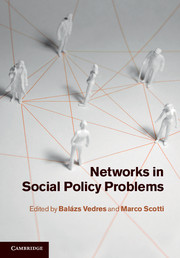Book contents
- Frontmatter
- Contents
- List of contributors
- Acknowledgements
- 1 Introduction
- Part I Information, collaboration, innovation: the creative power of networks
- Part II Influence, capture, corruption: networks perspectives on policy institutions
- Part III Crisis, extinction, world system change: network dynamics on a large scale
- 10 How creative elements help the recovery of networks after crisis: lessons from biology
- 11 Networks and globalization policies
- 12 Network science in ecology: the structure of ecological communities and the biodiversity question
- 13 Supply security in the European natural gas pipeline network
- 14 Conclusions and outlook
- References
- Index
11 - Networks and globalization policies
from Part III - Crisis, extinction, world system change: network dynamics on a large scale
Published online by Cambridge University Press: 05 September 2012
- Frontmatter
- Contents
- List of contributors
- Acknowledgements
- 1 Introduction
- Part I Information, collaboration, innovation: the creative power of networks
- Part II Influence, capture, corruption: networks perspectives on policy institutions
- Part III Crisis, extinction, world system change: network dynamics on a large scale
- 10 How creative elements help the recovery of networks after crisis: lessons from biology
- 11 Networks and globalization policies
- 12 Network science in ecology: the structure of ecological communities and the biodiversity question
- 13 Supply security in the European natural gas pipeline network
- 14 Conclusions and outlook
- References
- Index
Summary
This chapter argues for connecting models of several kinds of macro- and microprocesses as they affect structure and dynamics in the globalization of networks of trade. The purpose is to explore multiple levels of structure, process, and adaptation and to loosen assumptions about determinacy in models of networks and globalization. As do many models of emergence, it questions the notions of inevitability that too often surround studies of globalization. Particularly useful for comparison of cases are the models of “world system” developed by Modelski and Thompson (1996, see Devezas and Modelski, 2008). These focus on national policy-driven innovation and processes of European “evolutionary learning” that began in the 1400s. They put into context the models that focus on core-periphery structure as developed by Braudel (1973), or the “world-system” core-periphery model that for Wallerstein (1974) begins in the 1600s. Study of structures of core-periphery in world systems can benefit from added dimensions, improved measurement of network structure, and understanding the effects of periodic crises in terms of historical dynamics.
An unexpected outcome of this survey for issues of policy is that it develops a deeper historical understanding of how certain kinds of exchange systems develop several kinds of inequalities that are inimical to the concept of fair pricing in the operation of market equilibria, even in the absence of economic oligopolies (monopoly, duopoly) and oligopsonies (monopsony, duopsony). These include longstanding militaristic state-policy domination of international exchange, resultant structural inequality in international trade networks, and cyclical events within polities, that in periods of resource scarcity relative to population, create periods of extreme deflation of wages relative to extremes in elite dominance over wealth-generating property ownership.
Information
- Type
- Chapter
- Information
- Networks in Social Policy Problems , pp. 189 - 219Publisher: Cambridge University PressPrint publication year: 2012
